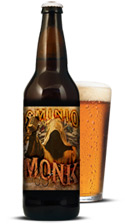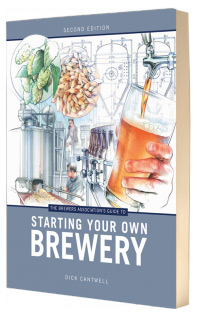Kentucky-based Alltech honored two brewing and distilling pioneers at its first International Craft Brewing and Distilling Convention, held last week in Dublin, Irelnd.
“Both recipients have dedicated their lives to educating and inspiring young brewers and distillers, while being innovative in the industry in their own professional capacity,” Alltech president Perase Lyons said, announcing awards to Graham Stewart and Bill Owens.
Stewart received the outstanding service in brewing and distilling education award. He is professor emeritus in brewing and distilling at Heriot-Watt University, Edinburgh, and special professor in bioethanol fermentation at The University of Nottingham, England.
He received his BSc in microbiology and biochemistry from the University of Wales and his PhD and DSc degrees from Bath University. He was the director of the International Centre for Brewing and Distilling at Heriot-Watt University from 1994-2007. He held a number of positions with the Labatt Brewing Company in Canada, serving as technical director from 1986 to 1994. Since retirement, he has established a consulting company – GGStewart Associates, based in Cardiff, Wales, which provides guidance to the alcohol and fermentation industries.
Stewart was president of the Institute of Brewing (now the Institute of Brewing and Distilling, or IBD) in 1999 and 2000. He is a member of the American Society of Brewing Chemists (ASBC) and the Master Brewers Association of the Americas (MBAA). He holds fellowships in the IBD, the Institute of Biology and the American Academy of Microbiology. Stewart has more than 300 publications to his name. Honors include the Horace Brown Medal of the IBD (2009), the Award of Distinction of the ASBC (2008), the Presidential Award of the MBAA (1983, 1998) and its Award of Merit (2009) and the Charles Thom Award of the Society of Industrial Microbiology (1988).
Owens was honored with the lifetime achievement in craft distilling award.
Following a successful career in photography, Owens began brewing beer again in the 1960s. He later left journalism and opened Buffalo Bill’s Brewery in 1983, the first brewpub in California, followed by Brewpub on the Green and The Bison Brewing Company. He also founded and spent two decades as publisher of American Brewer magazine, and later started BEER: The Magazine. In 2002, he founded the American Distilling Institute (ADI) and still serves as its president today. The institute has more than 600 members and hosts an annual conference drawing 900 attendees. It will host its first one-day Craft Distilling Expo in London in the fall of 2013.

 Dominion Brewing in Delaware and Dawson’s Liquors in Maryland have collaborated on a beer they call Monk Czech, a Czech Pilsner inspired Belgian-style Ale. A press release states there’s a legend that a beer like this was first brewed in 1840 using black market malt smuggled out of Plzeň by monks. This brewer/retailer collaboration utilizes Saaz, Tradition, Motueka and Nelson Sauvin hops and pilsner malt for a 5.2% ABV beer with 45 IBUs. The beer is fermented with a Belgian yeast, imparting fruity aromas and flavors, as well as a restrained spiciness.
Dominion Brewing in Delaware and Dawson’s Liquors in Maryland have collaborated on a beer they call Monk Czech, a Czech Pilsner inspired Belgian-style Ale. A press release states there’s a legend that a beer like this was first brewed in 1840 using black market malt smuggled out of Plzeň by monks. This brewer/retailer collaboration utilizes Saaz, Tradition, Motueka and Nelson Sauvin hops and pilsner malt for a 5.2% ABV beer with 45 IBUs. The beer is fermented with a Belgian yeast, imparting fruity aromas and flavors, as well as a restrained spiciness. Dominion Brewing has released a Pinup Pack, a variety 12-pack containing three of its popular Bomber Girls. The Pinup Pack contains Double D IPA, Morning Glory Espresso Stout and GiGi’s Farmhouse Ale. Originally bottled in 22-ounce bombers last year, Double D and Morning Glory made the switch to 12-ounce bottles earlier in the year. GiGi joins them in the 12-ounce format exclusively for the Pinup Pack. She will be replaced by Candi, a Belgian Tripel, in September. “Our goal with the Pinup Pack is to introduce more people to Double D, Glory and GiGi,” Jim Lutz, president of Forham and Dominion Brewing, said. The variety pack gives us a great platform to showcase each beer’s unique personality.”
Dominion Brewing has released a Pinup Pack, a variety 12-pack containing three of its popular Bomber Girls. The Pinup Pack contains Double D IPA, Morning Glory Espresso Stout and GiGi’s Farmhouse Ale. Originally bottled in 22-ounce bombers last year, Double D and Morning Glory made the switch to 12-ounce bottles earlier in the year. GiGi joins them in the 12-ounce format exclusively for the Pinup Pack. She will be replaced by Candi, a Belgian Tripel, in September. “Our goal with the Pinup Pack is to introduce more people to Double D, Glory and GiGi,” Jim Lutz, president of Forham and Dominion Brewing, said. The variety pack gives us a great platform to showcase each beer’s unique personality.”